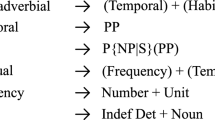Abstract
We introduce a rule based tagger of temporal expressions, ITUTime, for detecting and normalizing temporal expressions in Turkish language. The proposed system is morphologically aware and does not require any preprocessing steps, since ITUTime operates on free text. We also establish the first temporally annotated dataset of Turkish language. The work presented here locates itself as a baseline for tagging Turkish temporal expressions. The proposed system is evaluated on manually annotated test dataset and achieved 0.89 F1 score on recognizing and 0.89 F1 score on normalization.
Access this chapter
Tax calculation will be finalised at checkout
Purchases are for personal use only
Similar content being viewed by others
References
Chambers, N.: NavyTime: Event and time ordering from raw text. Technical report, NAVAL ACADEMY ANNAPOLIS MD (2013)
Chang, A.X., Manning, C.D.: SUTime: a library for recognizing and normalizing time expressions. In: Lrec, vol. 3735, p. 3740 (2012)
Devlin, J., Chang, M.W., Lee, K., Toutanova, K.: Bert: Pre-training of deep bidirectional transformers for language understanding. arXiv preprint arXiv:1810.04805 (2018)
Filannino, M., Brown, G., Nenadic, G.: ManTIME: Temporal expression identification and normalization in the TempEval-3 challenge. arXiv preprint arXiv:1304.7942 (2013)
Küçük, D., Küçük, D.: On TimeML-Compliant Temporal Expression Extraction in Turkish. arXiv preprint arXiv:1509.00963 (2015)
Mingli, W., Wenjie, L., Qin, L., Baoli, L.: CTEMP: A Chinese temporal parser for extracting and normalizing temporal information. In: Dale, R., Wong, K.F., Su, J., Kwong, O.Y. (eds.) Natural Language Processing –IJCNLP 2005. IJCNLP 2005. Lecture Notes in Computer Science, vol. 3651, pp. 694–706. Springer, Berlin, Heidelberg (2005). https://doi.org/10.1007/11562214_61
Oflazer, K.: Two-level description of Turkish morphology. Lit. Ling. Comput. 9(2), 137–148 (1994)
Olex, A., Maffey, L., Morgan, N., McInnes, B.: Chrono at SemEval-2018 Task 6: a system for normalizing temporal expressions. In: Proceedings of The 12th International Workshop on Semantic Evaluation, pp. 97–101 (2018)
Pustejovsky, J., et al.: TimeML: robust specification of event and temporal expressions in text. New Dir. Quest. Answ. 3, 28–34 (2003)
Pustejovsky, J., et al.: The timebank corpus. In: Corpus linguistics, vol. 2003, p. 40. Lancaster, UK (2003)
Saleh, I., Tounsi, L., van Genabith, J.: Zaman and raqm: extracting temporal and numerical expressions in Arabic. In: Salem, M.V.M., Shaalan, K., Oroumchian, F., Shakery, A., Khelalfa, H. (eds.) Information Retrieval Technology. AIRS 2011. Lecture Notes in Computer Science, vol. 7097, pp. 562–573. Springer, Berlin, Heidelberg (2011). https://doi.org/10.1007/978-3-642-25631-8_51
Saurı, R., Littman, J., Knippen, B., Gaizauskas, R., Setzer, A., Pustejovsky, J.: TimeML Annotation Guidelines Version 1.2.1 (2006)
Starỳ, M., Nevěřilová, Z., Valčík, J.: Multilingual recognition of temporal expressions. In: RASLAN 2020 Recent Advances in Slavonic Natural Language Processing, p. 67 (2020)
Strötgen, J., Gertz, M.: Multilingual and cross-domain temporal tagging. Lang. Resour. Eval. 47(2), 269–298 (2013)
UzZaman, N., Llorens, H., Derczynski, L., Allen, J., Verhagen, M., Pustejovsky, J.: Semeval-2013 task 1: Tempeval-3: evaluating time expressions, events, and temporal relations. In: Second Joint Conference on Lexical and Computational Semantics (* SEM), Volume 2: Proceedings of the Seventh International Workshop on Semantic Evaluation (SemEval 2013), pp. 1–9 (2013)
Verhagen, M., et al.: Automating temporal annotation with TARSQI. In: Proceedings of the ACL Interactive Poster and Demonstration Sessions, pp. 81–84 (2005)
Zaraket, F., Makhlouta, J.: Arabic temporal entity extraction using morphological analysis. Int. J. Comput. Ling. Appl. 3(1), 121–136 (2012)
Zhong, X., Cambria, E., Hussain, A.: Extracting time expressions and named entities with constituent-based tagging schemes. Cogn. Comput. 12, 844–862 (2020)
Author information
Authors and Affiliations
Corresponding author
Editor information
Editors and Affiliations
Rights and permissions
Copyright information
© 2022 The Author(s), under exclusive license to Springer Nature Switzerland AG
About this paper
Cite this paper
Uzun, A., Tantuğ, A.C. (2022). ITUTime: Turkish Temporal Expression Extraction and Normalization. In: González, S.R., et al. Distributed Computing and Artificial Intelligence, Volume 2: Special Sessions 18th International Conference. DCAI 2021. Lecture Notes in Networks and Systems, vol 332. Springer, Cham. https://doi.org/10.1007/978-3-030-86887-1_7
Download citation
DOI: https://doi.org/10.1007/978-3-030-86887-1_7
Published:
Publisher Name: Springer, Cham
Print ISBN: 978-3-030-86886-4
Online ISBN: 978-3-030-86887-1
eBook Packages: Intelligent Technologies and RoboticsIntelligent Technologies and Robotics (R0)




